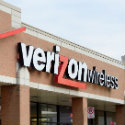Verizon docks private 5G network at UK's largest shipping port
Verizon partnered with Nokia to deploy a private 5G network for Southampton, the largest of the 21 Associated British Ports.

BIG 5G Event, Denver – COVID-19's impact on manufacturing and the supply chain has had a ripple effect on the global economy, which is why Verizon's keynote on its private 5G network for the UK's largest shipping port resonates with enterprises and consumers alike.
"Just a small hiccup – and we've even seen massive disruptions in the past few months – can really cause huge delays across industries, which in turn has big economic repercussions," said Jennifer Artley, SVP of Strategic Initiatives for Verizon Business, in a keynote yesterday morning. "Our supply chains, and the roads, rails, airways and waterways that keep our goods moving have to work together efficiently to keep global commerce afloat."
Figure 1:  Verizon Business SVP Jennifer Artley delivers the opening keynote at day 2 of the BIG 5G Event in Denver.
Verizon Business SVP Jennifer Artley delivers the opening keynote at day 2 of the BIG 5G Event in Denver.
In 2015, the port industry invested about $400 million in IoT, and increased that investment to over $1 billion in 2020, according to Deloitte's Global Ports Trend 2030 report.
"That level of investment is what set the stage for the global ports industry to be able to innovate today," said Artley.
Artley explained how Verizon partnered with Nokia to deploy a private 5G network for Southampton, the largest of the 21 Associated British Ports. ABP's ports combined handle 85 million tons of cargo, help generate 10% of the UK's electricity and contribute £7.5 billion a year to the UK's economy.
ABP approached Verizon about upgrading its Wi-Fi network, which only had intermittent coverage and was unable to provide connectivity throughout the port. Verizon's solution was to deploy a new 5G private network because 5G connectivity would be more cost effective than an extensive fiber buildout, said Artley.
Spectrum used at the UK port is 3.7GHz , which is similar to the midband C-band in the US. The network spans seven transmission sites running Nokia equipment, whereas the port's Wi-Fi network uses 200 access points.
"With that private 5G network, [ABP] enabled real-time analytics, workflow management, critical asset tracking and much greater efficiency across the entire ecosystem," said Artley. Southampton alone employs 45,000 people, transports about 1 million vehicles and nearly 2 million passengers travel through the port. The port also contributes around $2 billion to UK's economy.
Artley said the port's first application for the private 5G network will be for drone operations. The port plans to use drones to quickly inspect cranes after storms, rather than human inspectors, in order to allow the port to more quickly resume operations. Further, Verizon officials said the port also plans to sell access on the network to customers passing through its location.
Artley also looked ahead to future applications for the private 5G network at Southampton. This port is the access point for all cars from one, unnamed US car manufacturer to distribute their vehicles throughout the UK. Artley invited the audience to imagine a time when those cars can be offloaded and distributed from the port to their final location via autonomous driving.
— Kelsey Kusterer Ziser, Senior Editor, Light Reading
About the Author(s)
You May Also Like












